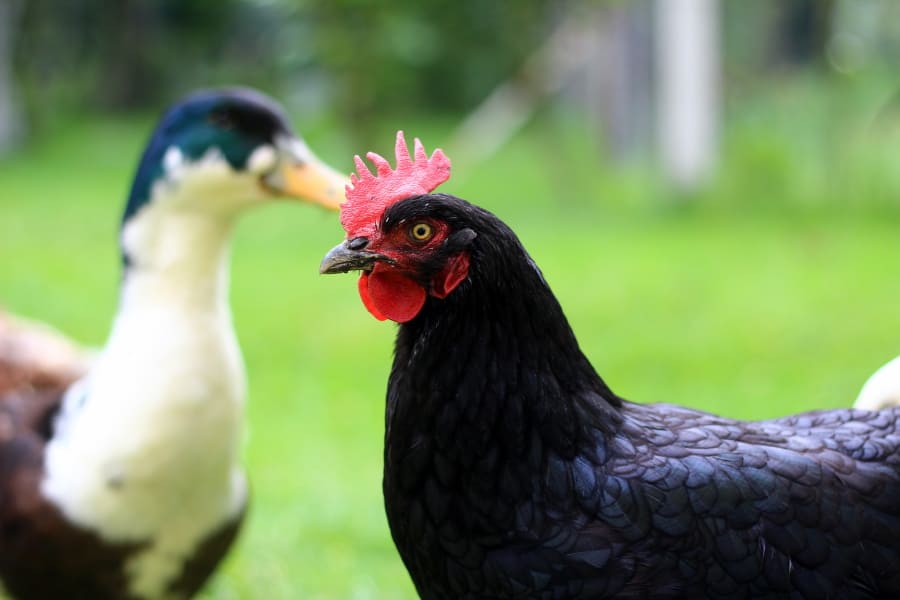
Ducks are adorable, and if you are already keeping chickens in your yard, it seems natural to add some ducks. However, ducks lay eggs all year long, and chicken owners might be wondering how much more trouble it creates to add ducks to the mix.
Can a chicken raise ducks? Yes, a chicken can raise ducks and even bond with them. It is not unusual to see on a farm or in a backyard. However, there are some differences between ducks and chickens that complicate things.
Read on to learn the inherent strength of a bond between a chicken and a duck and what can stand in the way of raising chickens and ducks together so you can best create space suitable for all your poultry friends.
Can a Chicken Raise Ducks?
As chicks and ducks hatch, they become attached to their mothers right away. This imprinting is vital as these babies need to follow their mothers around closely to remain safe and learn how to get along in life. The strength of this bond is highlighted in research conducted by Leonard A. Eiserer in the Journal of the Experimental Analysis of Behavior titled “Long-term potential for imprinting in ducks and chickens.”
If a hen sits on a duck egg and the baby ducks see the hen first upon hatching, the ducks imprint on that hen and look to that hen as its mother. The hen is likely to accept the ducks as her own and teach them how to get along in the chicken coop.
Incubation Time
A chicken egg takes at least 21 days to hatch, whereas a duck egg takes a week longer. If a hen has both chicken and duck eggs at the same time, there is a risk she will abandon the duck eggs before they have a chance to hatch. However, if the hen is just brooding on duck eggs, she will sit on them until they hatch. If you have a brooding hen, it might be worthwhile just to have her sit on duck eggs.
The Problems with Water
While chickens might accept ducks as one of their own, there are some challenges with raising them together when it comes to their differences with water.
Ducks tend to gravitate towards water. They love to play in the water and tend to make a mess in the mud. They like to splash when they frolic in the water, and many who keep ducks find a way to give their ducks access to water for that reason. If a pond is not an option, a kiddie pool will work.
Ducks do not just play with the water. Ducks need specific drinkers so they can submerge their bills when eating. These drinkers are wide enough and deep enough for ducks to submerge their bills.
Chickens, by comparison, like to stay dry. The feathers on a chicken are not waterproof like their duck friends. They need their feathers to keep dry to stay warm, and wet chickens tend to get sick.
Water Serves Another Purpose in Raising Chickens and Ducks
Ducks have waterproof feathers to insulate them and keep them dry while playing in the water. For a duck, though, water is not just for playing. Ducks need water to help them digest food.
According to J. Dale James, Ph.D., in his article titled “Understanding Waterfowl: Duck Digestion,” ducks depend on access to water to digest their food. By contrast, chickens need insoluble grit to grind down and digest their food. According to Terry E. Poole’s research for the University of Maryland titled, “Introduction to Developing a Free-Range Poultry Enterprise,” typically, free-range chickens get grit from pecking at the ground. Otherwise, chickens must have grit supplemented with their food.
Lastly, another reason ducks tend to make a mess with water is that dunking their heads in water is one of the ways ducks clean themselves. They tend to make a mess, and they need to clear the build-up from their faces, so their nose and eyes stay clear and moist.
Bedtime
Frequently, owners like to put ducks in the same coop as their chickens to keep predators away at night. Ducks play and make lots of noise while taking short naps here and there. Chickens, on the other hand, prefer to sleep at night. Owners run the risk of having unhappy and unrested chickens if ducks are in the same coop.
If ducks and chickens are bunked together, there are some practical considerations to make things easier. Make sure there is plenty of ventilation as ducks tend to create some condensation. This precaution will help with respiratory issues.
Plan on not keeping water in the bunk area as ducks tend to get into the water and create a mess. Wet feed and mud attract bugs and other pests, plus, respiratory issues could be caused by the dampness.
Many poultry owners successfully create sleeping quarters for both their ducks and chickens, and this set up means there are fewer issues with predators. Plus, the extra body heat keeps everyone warm.
Separation Anxiety
Separation anxiety happens in the poultry world. As ducks and chickens grow up together and become a family, they instinctively want to be near one another. While this is cute for many reasons, it can also create some problems.
For instance, baby ducks will gravitate towards the water, whereas the hen will instinctually not go into the water. Watching their baby ducks head into the water creates anxiety for the hen and significant problems for little chicks who risk drowning by following their brother and sister ducks into the water.
Also, when the ducks are little, they are unable to follow the hen when it is time to sleep. This creates separation anxiety for the ducks, as well.
Pecking Order with Poultry
Ducks are rather easygoing and don’t concern themselves with a pecking order. Chickens, on the other hand, take the pecking order serious enough to bully or kill a new member of the flock without having enough time to get to one another.
Chickens do not seem to add ducks into the process of the pecking order, and they seem to get along fine with introductions. It does pay to keep an eye on any new members to the flock, though, because chickens can be rather aggressive.
Medical Concerns
Fortunately, while there are medical concerns with poultry, having ducks and chickens together does not create any additional concerns for one another. The best way to keep them healthy is to keep their areas clean. The need for cleanliness validates the idea that ducks should be fed separately from one another since the mess they make creates a breeding ground for bacteria in food and bedding.
Feeding Time
While chickens and ducks might have some trouble getting along while drinking water, they get along great at feeding time. As adults, chickens and ducks eat the same foods. Ducks, though, need extra niacin, so their food should be separated so the ducks can have their supplement.
Drakes and Roosters
Drakes are male ducks and roosters are male chickens. If you have a mix of female ducks and chickens, they are likely to get along just fine. There are some different considerations when you add males to the flock.
According to the fact sheet supplied by The Humane Society of the United States titled, “About Chickens,” male poultry makes it a priority to protect the females of the flock.
Drakes tend to pick fights with hens and roosters, so it is recommended to balance the flock with no more than two drakes for every hen. This way, the drakes refocus their attention on protecting the females of the flock.
In Conclusion
While chickens can raise ducks, there are some considerations because they are different types of poultry with different needs.
Make sure ducks and chickens have different and separate sources of water. Chickens need to dip their beaks where a duck needs to duck its whole head in, if not its entire body. Chickens tend not to appreciate this level of enthusiasm for splashing water while drinking.
Also, create a separate space for ducks to enjoy swimming in water. You won’t have to worry about adults drowning, but baby chicks are not safe near water.
Your chickens and ducks can live together in a coop. Your chickens may not be as enthusiastic about the noise ducks make at night, but the noise will keep predators away. Also, the added warmth of the duck’s body heat might be welcome in the coop in colder weather.

